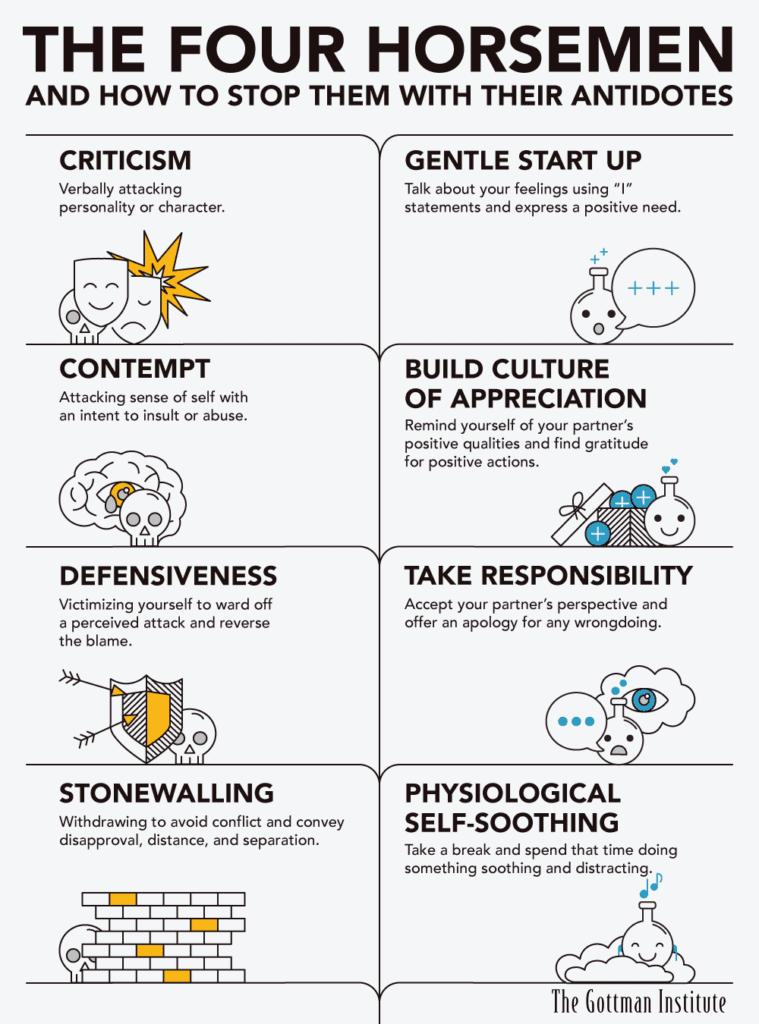

What are the Golden Rules for a Happy Relationship?


Relationships are a fundamental part of our society. They have been around for as long as humans have walked the earth, and will continue to be a part of our lives. However, relationships in the modern world are different from those in the past. The Gottman Institute has been researching relationships for more than 40 years now, and they have studied more than 3000 couples. When it comes to relationships, they are the experts as they’ve conducted immense research on romantic relationships and have deduced numerous inferences from that. The insights that they have arrived at holds good for both romantic and platonic relationships. Let’s now dive into this blog to learn about the golden rules for a happy relationship in this modern world.
4 Horsemen of Relationship Apocalypse – What are they? And how to overcome them?
Relationships are challenging. It’s a time-consuming and often thankless task to maintain one. But, as long as you’re willing to put in the work, they can be rewarding and fulfilling. A lot of people have a misconception that relationships will just happen on their own, but this couldn’t be further from the truth.
The following are the four horsemen [1] that can cause a relationship apocalypse:
- Criticism
- Contempt
- Defensiveness
- Stonewalling


Criticism
Criticism in a relationship is inevitable. But it doesn’t have to be bad for your relationship. There are many ways you can deal with criticism and make it better for both of you. The Gottman Institute says that criticism is verbal attacking or blaming your partner [1] & [2]. Criticism can have a negative effect on the couple and their relationship. It can lead to emotional abuse and cause problems in the family as well. A lot of couples don’t know how to deal with criticism in their marriage so they just ignore it or take it personally which only worsens the situation.


Eg. ‘Why is it that you are always late?’ – Criticizing question between couples
‘Why should we always make time for you?’ – Criticizing questions between friends.
The antidote to criticism according to Gottman is a Gentle Startup [2]. There are many ways to reduce criticism which will lessen its effects on the couple’s relationship.
To name a few…
- Make sure you are calm and use a non-judgmental tone of voice
- Focus on the behavior and not the person
- Be specific and focus on what you want them to change
- Give examples of what you want them to do better next time
- Avoid criticizing your partner in front of others, etc
There are many ways that criticism can affect a relationship, but the important thing is how we deal with it. If we want our relationships to be healthy and happy, then we need to learn how to maintain a healthy balance between criticism and appreciation.
Contempt
The most crucial predictive factor of a strained/divorced relationship is contempt. If there is contempt in a relationship you can be certain that it is surely going downhill. According to Gottman [1] & [2], contempt is attacking self/partner/friends with insult/abusive language that communicates superiority. As a golden rule for a happy relationship, it is super important to avoid contempt at any cost.


Contempt can be shown in many different ways, such as rolling one’s eyes, sarcastic remarks, and condescending comments about someone else’s ideas. Contempt can also be passive-aggressive behavior such as not listening to what the other person has to say, ignoring their needs and desires, not including them in important decisions or activities, and refusing to compromise.
Patronizing phrases such as…
- “I learned to tell the time when I was 5. When are you gonna learn that?”
- “I know how to shop online, why can’t you?”
- “Can’t you just read the guidelines and follow?”
The above statements are examples of contemptuous statements.
The antidote to contempt according to Gottman is to build a culture of appreciation. Replace contempt with expressing your own needs/feelings. Convey your needs positively instead of pointing out your partner’s flaws.
Eg. “It’s important that I need to be punctual. Please help me with that.” – This is an example of expressing one’s need in an assertive/gentle way. Expressing this way, you are making sure that you aren’t getting rid of your own need at the same time maintaining a healthy relationship.
Defensiveness
Defensiveness is the next predictive factor that the relationship is not going well. It is a way to protect oneself from the perceived threat of judgment, criticism, or attack. It can be a natural response to feeling threatened. In relationships, defensiveness can create conflict and lead to an erosion of trust and intimacy. Partners need to understand what kind of role defensiveness plays in their relationship and how it affects them as individuals and as a couple.
Gottman Institute sees defensiveness as victimizing oneself to ward off blame [1] & [2].
Eg. “Come on! I have a hard time waking up early in the morning”
Defensiveness can manifest itself in many ways, including anger, hostility, withdrawal, and denial. Some people will feel angry or hostile if they are criticized or challenged by others; some may withdraw from the situation; others may deny that there is any problem at all.
Defensiveness will be projected in one’s tone, body manners, and the other person is surely going to notice that.


Institute [2]. Accepting your partner’s/ friend’s perspective and offering an apology is a healthy way to take ownership of one’s own actions and portray responsibility.
Eg. A text saying, “Hey! I’m sorry that I didn’t text you back. I know that it would have hurt you” shows that you take responsibility for your actions.
Stonewalling
Stonewalling is the fourth and final horseman of the relationship apocalypse according to the Gottman Institute [1]. Stonewalling is withdrawing from interactions to avoid conflicts that result in disapproving, distancing, and separation [1] & [2].
Stonewalling is a way of avoiding or ending an argument by refusing to communicate. This can lead to the other partner feeling like they are arguing with a brick wall, which can lead to frustration, anger, and even resentment.
For example, when asked a question, dodging a conversation by shrugging shoulders displays a stonewalling mechanism. This is not helpful for a healthy relationship. Communication is essential for a relationship and lack of communication is unhealthy for a relationship.
Stonewalling in relationships is not only frustrating for the one who is stonewalled but also for the stonewaller. It can feel like you’re giving up and admitting defeat if you stop talking in order to end an argument.


The negative effects of stonewalling on relationships are that it creates distance between partners, it can cause resentment or anger between partners, and it may make one party feel like they are fighting with a brick wall.
The best antidote to stonewalling is self-soothing according to Gottman [2].
In order to prevent stonewalling from becoming the norm in your relationship, it is important to be aware of the signs that your partner may be shutting you out. If you find that your partner is withdrawing from their usual activities and responsibilities, or if they are less responsive than usual, this could be a sign that they are trying to avoid conflict.
The first step in preventing stonewalling is to acknowledge when it has happened and what caused it. It can be helpful to talk about what you saw and how you felt in order to get a better understanding of where the other person is coming from.
Ask for a break. Use a signal /a word that both the parties can agree on. Spend the break on calming activities of your own.
Eg. “Can we talk about this later as I’m getting overwhelmed” – This kind of phrase soothes the conversation and facilitates good communication.
When you feel highly motivated to stonewall a person, take a break. Calm yourself and then come back to converse. This way you can sort out the conflict amicably. Good communication is the key to a successful relationship, be it platonic or romantic.


Attachment Styles for a Healthy Relationship
It is important to understand the attachment styles of healthy relationships in order to be able to build and maintain healthy relationships. In a healthy relationship, both partners should be comfortable with their attachment styles. The attachment style of the partner is a measure of how they feel about relationships and how close they want to be to their partner.
Secure attachment styles are characterized by a sense of trust, intimacy, and support from the partner. Insecure attachments are characterized by anxiety, mistrust, and fear for the relationship.
In the preoccupied attachment [3], one tends to work on everyone else’s needs except for his/her own. The preoccupied attachment style is an anxious attachment. This type of attachment is characterized by a desire to be close to the other person, but also by fear of abandonment.
In the dismissive attachment [3], one tends to think that he/she doesn’t need anyone else/any kind of relationship in their life. Dismissive attachment style is a term used to describe someone who has an “avoidant” attachment style.
This person is not looking for intimacy in their relationships and they are not emotionally invested. They are usually looking for someone to act as a “safe haven” during the good times, but they will push that person away during the bad times.
This type of attachment style can be frustrating for both partners in the relationship because it causes one partner to feel unappreciated and unwanted while the other partner feels like they’re being taken advantage of.
If you think of attachments, you need to be right in the middle, find a middle ground – a happy middle. You need people and things around at the same time you also need your self-time and personal space. The happy middle strikes a balance between these two.
A healthy relationship is a balance between good boundaries, healthy expression of feelings/expressing one’s needs in addition to criticism, defensiveness, contempt, and stonewalling. There are many ways to have a healthy relationship. The key is, to be honest, have a positive attitude, and have open communication. This will allow you to be more comfortable and confident with each other.


Winding Up with the Golden Rules for a Happy Relationship
Relationships are messy; relationships are hard. They require work and compromise. But, when you find the right person, the rewards are worth it. The 4 Horsemen of Relationship Apocalypse – Criticism, Contempt, Defensiveness, Stonewalling if left unchecked, can lead to a relationship’s demise. It is important for couples to know what these behaviors are and how to address and deal with them so they can work on them before it’s too late. “Forgiveness is relational breathing,” says a psychology professor. Good communication, forgiveness, talking about feelings & emotions, and needs are some of the golden rules to live by and make relationships better and happier.
You can spend your life with someone who makes you feel loved and cared for. You can spend time with someone who shares your interests and passions in life. And, when things get tough, you can always turn to someone to help you through it. Relationships take work but they are worth it in the end.
Feel like talking about the problems in your relationship? Reach out to us. Let’s figure things out and resolve them together.


